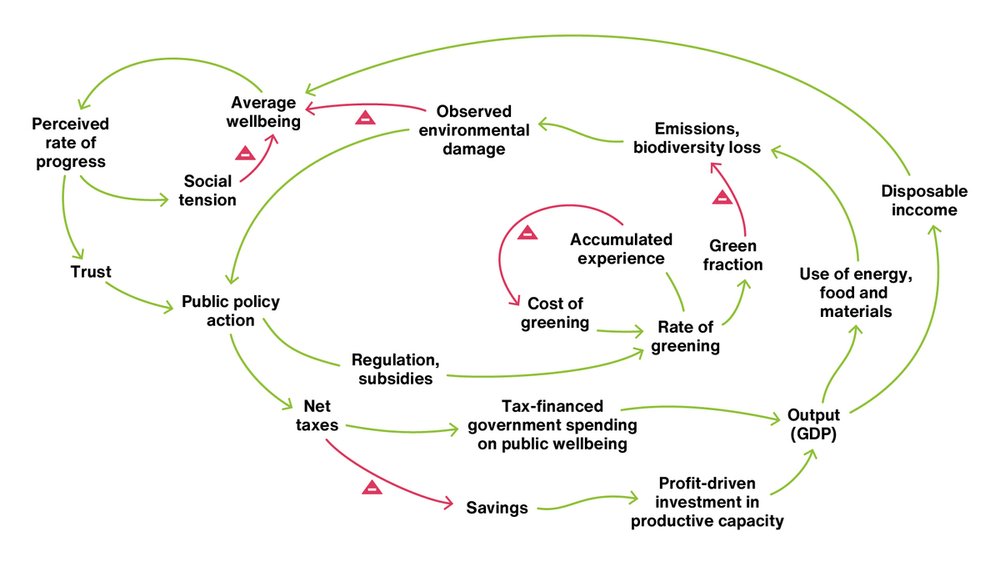Our story
In 1972, the Club of Rome commissioned a report – The Limits to Growth – to look at the interconnected issues and complex problems faced by humanity. The findings showed that if growth trends continued, we would overshoot the carrying capacity of the Earth, but this could be avoided with the implementation of forward-looking policies. The model behind the study – World3 – has been shown to be remarkably accurate and has undergone a number of developments.
For 50 years, since The Limits to Growth report and the 1972 UN Stockholm summit, the world has ignored the risk of system collapse.


The urgent need for transformation
In 2020, Earth4All brought together scientists, economic thinkers, and communicators to explore how we could accelerate the systems-change needed to achieve wellbeing for all on a finite planet.
Combining the best available science with new economic thinking, the teams worked together to explore and develop bold proposals for the 21st century.
Our analysis focuses on three deeply intertwined systems: economy, society and ecology. It is grounded in systems thinking, a branch of science whose tools help us understand complexity, feedback loops, tipping points and exponential impacts.
Our findings show the minimum actions we need to take now – 5 extraordinary turnarounds for poverty, inequality, empowerment, food and energy – to achieve wellbeing for all within planetary boundaries.
The Earth4All models
Earth4All uses models to show how different policies are likely to affect human wellbeing, societies and ecosystems in the short and long-term. Our modelling looks at the quantitative and causal interactions between environmental variables and socio-economic variables, such as investments, energy use, taxes, savings, education, inequality and social trust.
The main purpose of using the models is to answer questions like: What happens if societies adopt policies to redistribute wealth more fairly? What happens if policies to empower women are adopted? Or, what happens to our Earth if we turn around our energy system?
The great strength of models lies in answering the questions on the scale they were built for. Therefore, we rely on different models for our work:

- We use the global model to depict the main global trends in the Giant Leap and Too Little Too Late scenarios, providing insights into how five turnarounds tackling inequality, poverty, empowerment, food and energy can work together to enhance wellbeing within planetary boundaries, on a very aggregate level. The global model is open source (beta-version below).
- Our regional model uses a less aggregate regional model that allows to capture regional specificities and understand how the Giant Leap and Too Little Too Late scenarios can look like in different regional contexts.
- Translating the Giant Leap and Too Little Too Late scenarios to the national level is done in collaboration with the Millennium Institute by applying their iSDG model.
The models have been made available to the scientific community and we welcome discussion and feedback. A number of comments have been received as detailed in this document and the Earth4All modelling team provided this response, alongside a further response from Jørgen Randers.
The Earth4All scientific advisory teams are comprised of researchers from the Stockholm Resilience Centre, the BI Norwegian Business School and the Potsdam Institute for Climate Impact Research.
Transformational economics
What if the economic system changed its priorities, to work towards wellbeing of all instead of trying to maximise GDP at the expense of ecosystems, climate and societal trust? What if focus shifted to long-term prosperity for all instead of short-term profits for the few? What if we viewed the economy as a tool at the service of humanity, rather than an end in itself? These are some of the questions explored by the Transformational Economics Commission as part of the Earth4All initiative.
The Transformational Economics Commission is made up of economists and economic thinkers from across the globe. They contributed to the Earth4All model by bringing forward new economic ideas whose long-term impact on people, economies, nature and the planet was tested by the model. Members of the Transformational Economics Commissions also critiqued and challenged the model’s outputs. Today, they contribute regularly to the Earth4All initiative by developing thought-provoking papers called “Earth4All deep-dives”, exploring new paradigms for our economic and societal operating systems.
